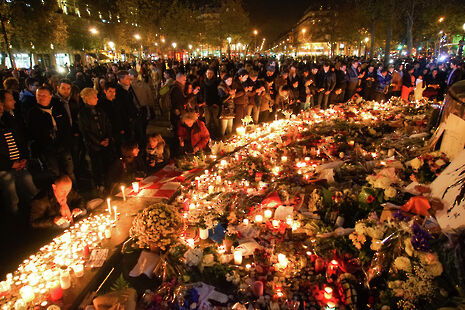Western egocentrism is a tale of two worlds
We need to tackle our obsession with western news, politics, literature and history, argues Alex Jacob

If news can be considered to be a marketable product, then we, its readers, are its consumers, shaping its agenda by virtue of our own attraction to certain types of news. Human nature means that those events which occur in close proximity to us demand our attention, thereby creating a kind of insularity in which we attach less importance to events which are further away. Hence the relationship between western media and western reader is self-perpetuating, leading to a bias in reporting.
Although it is perhaps an over-simplification to reduce the world to the binary of ‘The West’ and ‘The East’, this distinction is never more evident than during terror attacks; all too often those which occur in America and Europe gain significantly more media attention than elsewhere. The Beirut and Paris attacks of 2015 provide an apt example in that they occurred within one day of each other, with a similar number of deaths occurring from each. And yet, according to Google, only 5,190 articles appeared on the terror attacks in Beirut that day, compared with 2.5 million articles two days after the Paris attacks.
“High impact events in the Western bubble dominate the news”
Ultimately this discrepancy is unsurprising. I would even go as far as to say that it is understandable; an unusual event which occurs in close proximity to us is bound to draw more attention than the equivalent on another continent, especially given that co-ordinated attacks are more frequent in the Middle East. The point here is not to disgrace western readership for its tendency to focus only on western narratives, but to draw attention to our own fixation with the western world.
And on the subject of narratives, this fixation is not only limited to news: it is a fixation which can be seen in the historical, political and literary narratives of the western world. At Cambridge, the faculty of English has been around for almost 100 years and yet it is only now that some level of discussion about the diversification of its syllabus has been initiated by the decolonisation movement. The movement, as a whole, is defined by its attempt to promote black and ethnic minority authors within a curriculum which attempts to ‘elevate white male authors’ whilst dismissing those from the ‘global south.’
It is notable, not only for the publicity which it has gained, but also for the extent to which it has been challenged, partly through the deliberate misconstruction of its purpose. The Telegraph characterised the movement as a bid for supremacy, rather than equality, describing how it threatens to ‘drop’ white authors in favour of other marginalised authors.
The decolonisation initiative has an intrinsic importance; it is an affirmation of the cultural influence of an entire wealth of literature which is excluded from the western canon simply because of the circumstances of the birth of its authors. But it also has an instrumental importance: a more diverse curriculum could serve to attract more diverse students and hence help to break down the barriers to perceived elite institutions.
“A more diverse curriculum could serve to attract more diverse students”
The decolonisation initiative is symptomatic of a much greater problem, however: western egocentrism. Both the existence of the movement, and the resistance to its traction are evidence of this mentality. It is a mentality which is reflected, amongst other things, in our proclivity towards western news, western literature and western history. It is a mentality which encourages us to defend ‘traditional’ canonical authors and remain unreceptive to others. It is a mentality which drives the direction of the media, fuelling a kind of sensationalism in which high impact events within the western bubble dominate the news.
There is a clear pattern here in which we, as the consumers of western goods, gravitate towards the product with which we might feel familiar. But when we have the technological capacity to extend our global empathy outside of the western sphere, we must make a concerted effort to do so. This involves recalibrating our political perceptions, but it is also a cultural, bottom-up movement: after all it is only by examining marginalised literary narratives of the past that we can expand our own world view in the present
 News / Downing investigates ‘mysterious’ underground burial vault 29 December 2025
News / Downing investigates ‘mysterious’ underground burial vault 29 December 2025 Lifestyle / Ask Auntie Alice29 December 2025
Lifestyle / Ask Auntie Alice29 December 2025 News / Unions protest handling of redundancies at Epidemiology Unit30 December 2025
News / Unions protest handling of redundancies at Epidemiology Unit30 December 2025 Features / ‘Treated like we’re incompetent’: ents officers on college micromanagement30 December 2025
Features / ‘Treated like we’re incompetent’: ents officers on college micromanagement30 December 2025 Science / Astronomical events to look out for over the break29 December 2025
Science / Astronomical events to look out for over the break29 December 2025










